FY008 - Analyzing Ways of Learning About the Social World: A Report
VerifiedAdded on 2023/06/15
|7
|1568
|140
Report
AI Summary
This report explores ways of learning about the social world through the lens of social science, focusing on key concepts such as social class and ethnicity. It discusses social science as a method for understanding human behaviors and societal influences, highlighting its role in interpreting complex social dynamics. The report delves into social class, defining it as groups sharing similar socio-economic status and examining theories by Karl Marx and Max Weber. Ethnicity is also analyzed, with emphasis on Fredrik Barth's perspective on ethnic group identification and cultural symbols. The analysis concludes that social science provides valuable insights into understanding societies, individual behaviors, and the intricate relationships that shape the world around us. Desklib provides access to similar reports and study resources for students.
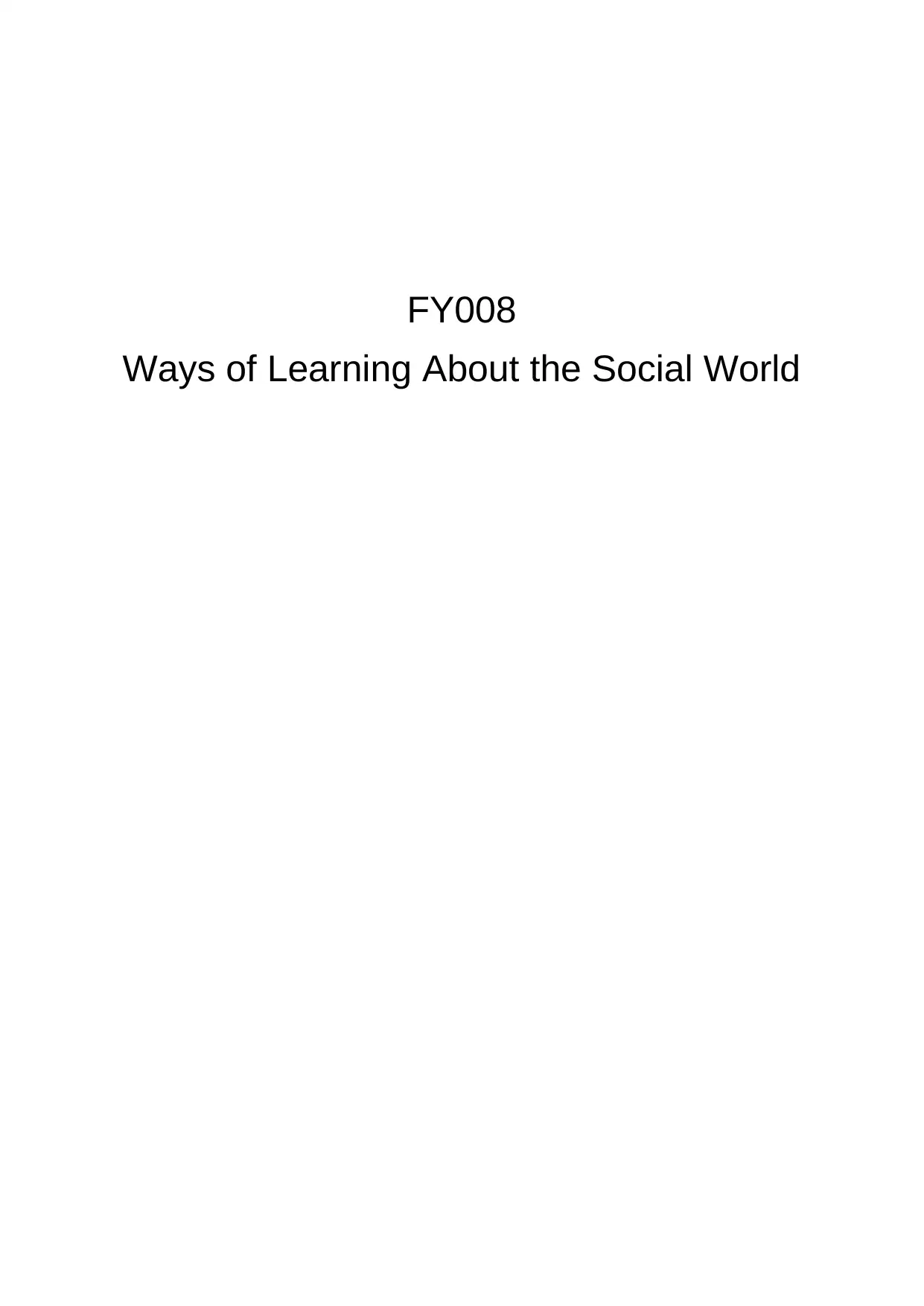
FY008
Ways of Learning About the Social World
Ways of Learning About the Social World
Paraphrase This Document
Need a fresh take? Get an instant paraphrase of this document with our AI Paraphraser

Table of Contents
Introduction..........................................................................................................................................2
Social science as a way of knowing about the social world......................................................2
Social class......................................................................................................................................3
Ethnicity............................................................................................................................................4
Conclusion...........................................................................................................................................5
References:............................................................................................................................................6
Introduction..........................................................................................................................................2
Social science as a way of knowing about the social world......................................................2
Social class......................................................................................................................................3
Ethnicity............................................................................................................................................4
Conclusion...........................................................................................................................................5
References:............................................................................................................................................6
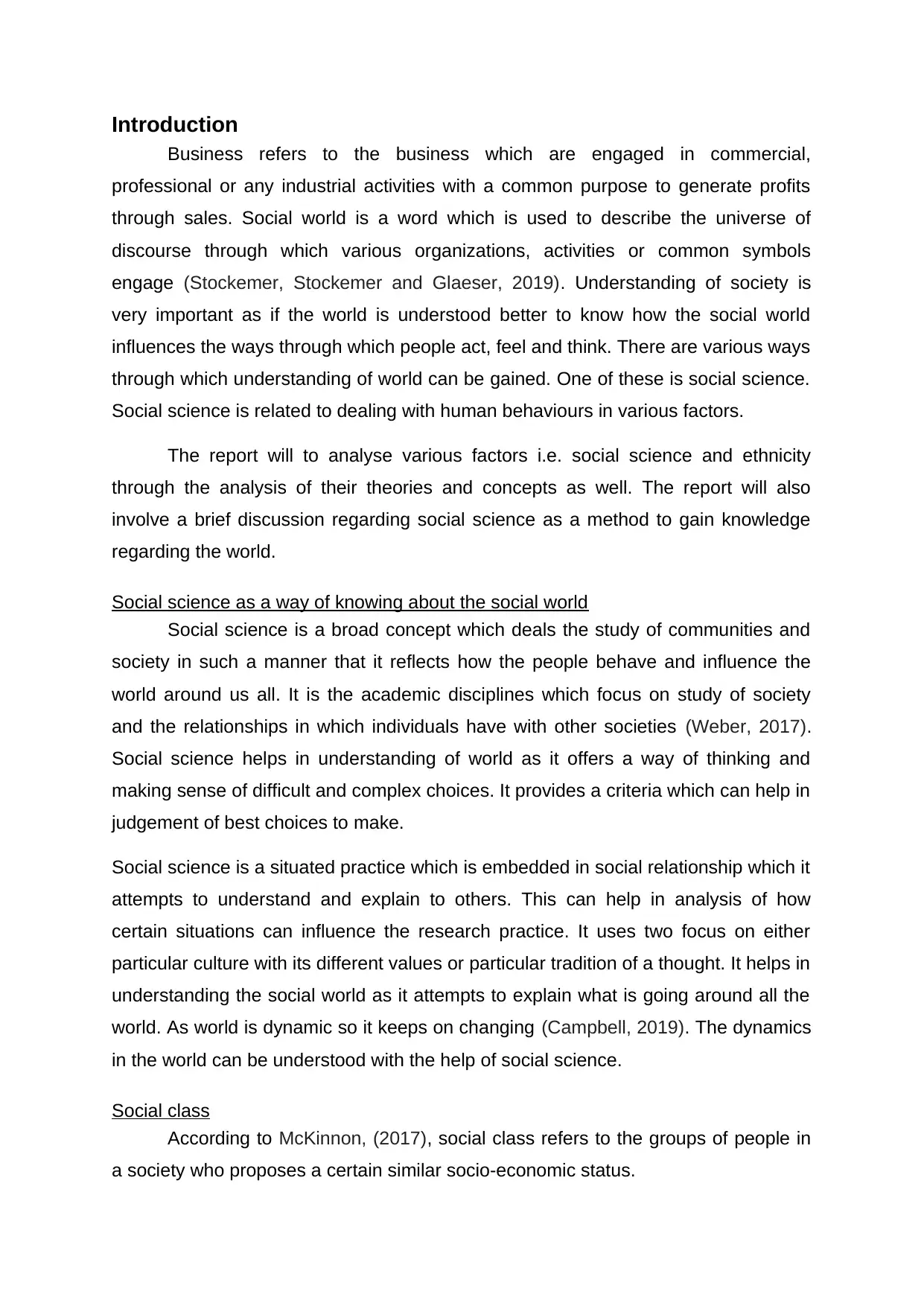
Introduction
Business refers to the business which are engaged in commercial,
professional or any industrial activities with a common purpose to generate profits
through sales. Social world is a word which is used to describe the universe of
discourse through which various organizations, activities or common symbols
engage (Stockemer, Stockemer and Glaeser, 2019). Understanding of society is
very important as if the world is understood better to know how the social world
influences the ways through which people act, feel and think. There are various ways
through which understanding of world can be gained. One of these is social science.
Social science is related to dealing with human behaviours in various factors.
The report will to analyse various factors i.e. social science and ethnicity
through the analysis of their theories and concepts as well. The report will also
involve a brief discussion regarding social science as a method to gain knowledge
regarding the world.
Social science as a way of knowing about the social world
Social science is a broad concept which deals the study of communities and
society in such a manner that it reflects how the people behave and influence the
world around us all. It is the academic disciplines which focus on study of society
and the relationships in which individuals have with other societies (Weber, 2017).
Social science helps in understanding of world as it offers a way of thinking and
making sense of difficult and complex choices. It provides a criteria which can help in
judgement of best choices to make.
Social science is a situated practice which is embedded in social relationship which it
attempts to understand and explain to others. This can help in analysis of how
certain situations can influence the research practice. It uses two focus on either
particular culture with its different values or particular tradition of a thought. It helps in
understanding the social world as it attempts to explain what is going around all the
world. As world is dynamic so it keeps on changing (Campbell, 2019). The dynamics
in the world can be understood with the help of social science.
Social class
According to McKinnon, (2017), social class refers to the groups of people in
a society who proposes a certain similar socio-economic status.
Business refers to the business which are engaged in commercial,
professional or any industrial activities with a common purpose to generate profits
through sales. Social world is a word which is used to describe the universe of
discourse through which various organizations, activities or common symbols
engage (Stockemer, Stockemer and Glaeser, 2019). Understanding of society is
very important as if the world is understood better to know how the social world
influences the ways through which people act, feel and think. There are various ways
through which understanding of world can be gained. One of these is social science.
Social science is related to dealing with human behaviours in various factors.
The report will to analyse various factors i.e. social science and ethnicity
through the analysis of their theories and concepts as well. The report will also
involve a brief discussion regarding social science as a method to gain knowledge
regarding the world.
Social science as a way of knowing about the social world
Social science is a broad concept which deals the study of communities and
society in such a manner that it reflects how the people behave and influence the
world around us all. It is the academic disciplines which focus on study of society
and the relationships in which individuals have with other societies (Weber, 2017).
Social science helps in understanding of world as it offers a way of thinking and
making sense of difficult and complex choices. It provides a criteria which can help in
judgement of best choices to make.
Social science is a situated practice which is embedded in social relationship which it
attempts to understand and explain to others. This can help in analysis of how
certain situations can influence the research practice. It uses two focus on either
particular culture with its different values or particular tradition of a thought. It helps in
understanding the social world as it attempts to explain what is going around all the
world. As world is dynamic so it keeps on changing (Campbell, 2019). The dynamics
in the world can be understood with the help of social science.
Social class
According to McKinnon, (2017), social class refers to the groups of people in
a society who proposes a certain similar socio-economic status.
⊘ This is a preview!⊘
Do you want full access?
Subscribe today to unlock all pages.

Trusted by 1+ million students worldwide
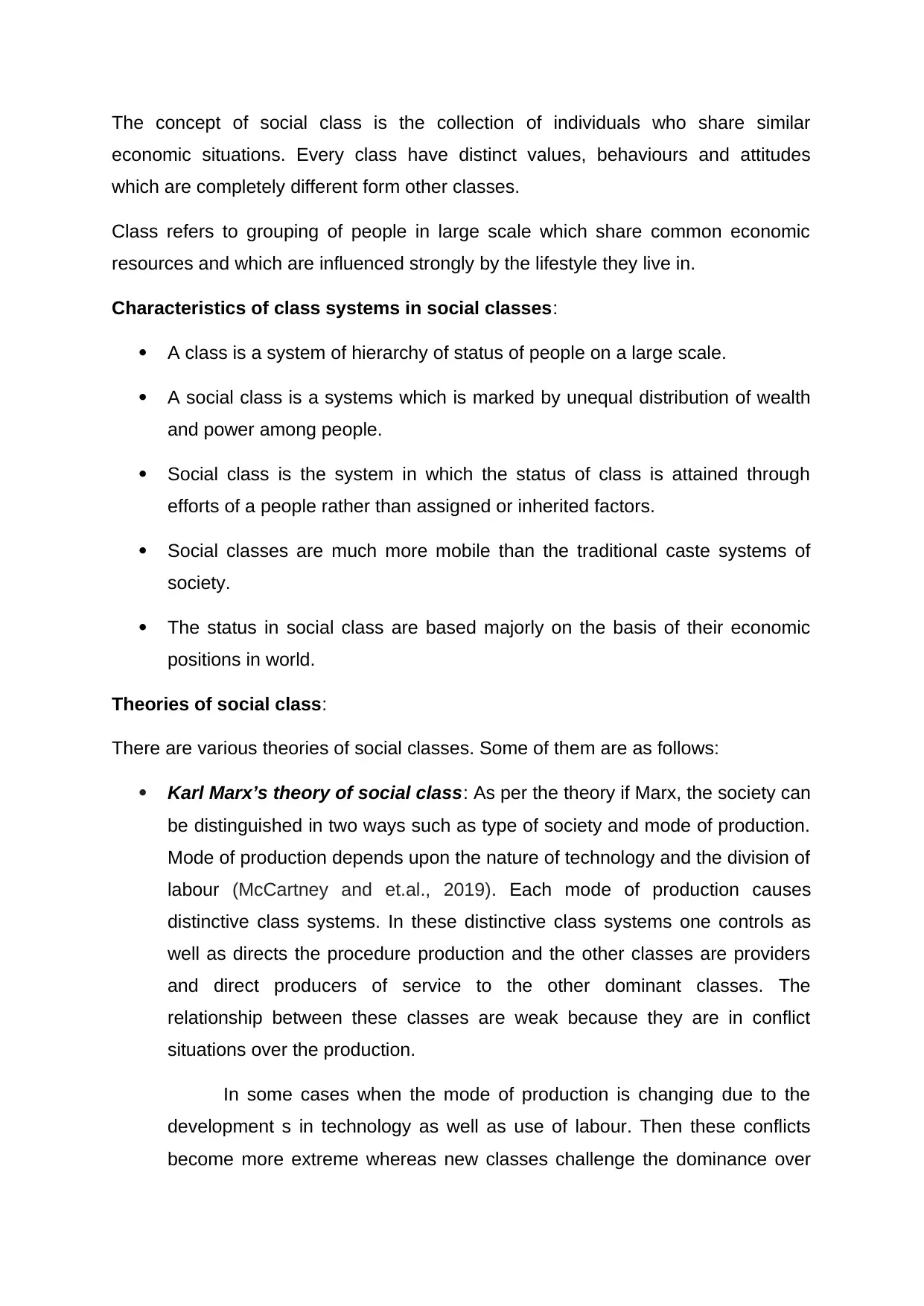
The concept of social class is the collection of individuals who share similar
economic situations. Every class have distinct values, behaviours and attitudes
which are completely different form other classes.
Class refers to grouping of people in large scale which share common economic
resources and which are influenced strongly by the lifestyle they live in.
Characteristics of class systems in social classes:
A class is a system of hierarchy of status of people on a large scale.
A social class is a systems which is marked by unequal distribution of wealth
and power among people.
Social class is the system in which the status of class is attained through
efforts of a people rather than assigned or inherited factors.
Social classes are much more mobile than the traditional caste systems of
society.
The status in social class are based majorly on the basis of their economic
positions in world.
Theories of social class:
There are various theories of social classes. Some of them are as follows:
Karl Marx’s theory of social class: As per the theory if Marx, the society can
be distinguished in two ways such as type of society and mode of production.
Mode of production depends upon the nature of technology and the division of
labour (McCartney and et.al., 2019). Each mode of production causes
distinctive class systems. In these distinctive class systems one controls as
well as directs the procedure production and the other classes are providers
and direct producers of service to the other dominant classes. The
relationship between these classes are weak because they are in conflict
situations over the production.
In some cases when the mode of production is changing due to the
development s in technology as well as use of labour. Then these conflicts
become more extreme whereas new classes challenge the dominance over
economic situations. Every class have distinct values, behaviours and attitudes
which are completely different form other classes.
Class refers to grouping of people in large scale which share common economic
resources and which are influenced strongly by the lifestyle they live in.
Characteristics of class systems in social classes:
A class is a system of hierarchy of status of people on a large scale.
A social class is a systems which is marked by unequal distribution of wealth
and power among people.
Social class is the system in which the status of class is attained through
efforts of a people rather than assigned or inherited factors.
Social classes are much more mobile than the traditional caste systems of
society.
The status in social class are based majorly on the basis of their economic
positions in world.
Theories of social class:
There are various theories of social classes. Some of them are as follows:
Karl Marx’s theory of social class: As per the theory if Marx, the society can
be distinguished in two ways such as type of society and mode of production.
Mode of production depends upon the nature of technology and the division of
labour (McCartney and et.al., 2019). Each mode of production causes
distinctive class systems. In these distinctive class systems one controls as
well as directs the procedure production and the other classes are providers
and direct producers of service to the other dominant classes. The
relationship between these classes are weak because they are in conflict
situations over the production.
In some cases when the mode of production is changing due to the
development s in technology as well as use of labour. Then these conflicts
become more extreme whereas new classes challenge the dominance over
Paraphrase This Document
Need a fresh take? Get an instant paraphrase of this document with our AI Paraphraser
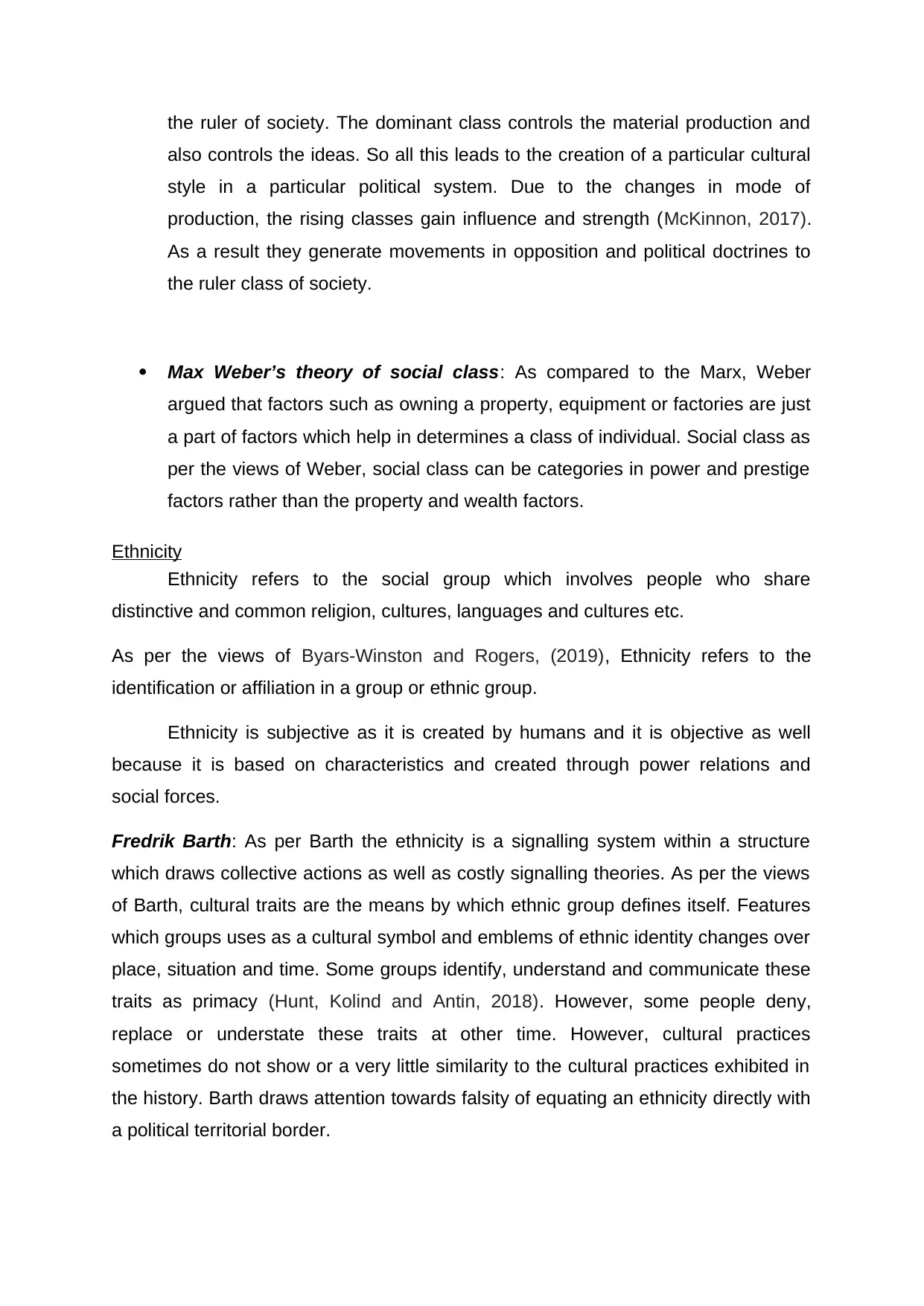
the ruler of society. The dominant class controls the material production and
also controls the ideas. So all this leads to the creation of a particular cultural
style in a particular political system. Due to the changes in mode of
production, the rising classes gain influence and strength (McKinnon, 2017).
As a result they generate movements in opposition and political doctrines to
the ruler class of society.
Max Weber’s theory of social class: As compared to the Marx, Weber
argued that factors such as owning a property, equipment or factories are just
a part of factors which help in determines a class of individual. Social class as
per the views of Weber, social class can be categories in power and prestige
factors rather than the property and wealth factors.
Ethnicity
Ethnicity refers to the social group which involves people who share
distinctive and common religion, cultures, languages and cultures etc.
As per the views of Byars-Winston and Rogers, (2019), Ethnicity refers to the
identification or affiliation in a group or ethnic group.
Ethnicity is subjective as it is created by humans and it is objective as well
because it is based on characteristics and created through power relations and
social forces.
Fredrik Barth: As per Barth the ethnicity is a signalling system within a structure
which draws collective actions as well as costly signalling theories. As per the views
of Barth, cultural traits are the means by which ethnic group defines itself. Features
which groups uses as a cultural symbol and emblems of ethnic identity changes over
place, situation and time. Some groups identify, understand and communicate these
traits as primacy (Hunt, Kolind and Antin, 2018). However, some people deny,
replace or understate these traits at other time. However, cultural practices
sometimes do not show or a very little similarity to the cultural practices exhibited in
the history. Barth draws attention towards falsity of equating an ethnicity directly with
a political territorial border.
also controls the ideas. So all this leads to the creation of a particular cultural
style in a particular political system. Due to the changes in mode of
production, the rising classes gain influence and strength (McKinnon, 2017).
As a result they generate movements in opposition and political doctrines to
the ruler class of society.
Max Weber’s theory of social class: As compared to the Marx, Weber
argued that factors such as owning a property, equipment or factories are just
a part of factors which help in determines a class of individual. Social class as
per the views of Weber, social class can be categories in power and prestige
factors rather than the property and wealth factors.
Ethnicity
Ethnicity refers to the social group which involves people who share
distinctive and common religion, cultures, languages and cultures etc.
As per the views of Byars-Winston and Rogers, (2019), Ethnicity refers to the
identification or affiliation in a group or ethnic group.
Ethnicity is subjective as it is created by humans and it is objective as well
because it is based on characteristics and created through power relations and
social forces.
Fredrik Barth: As per Barth the ethnicity is a signalling system within a structure
which draws collective actions as well as costly signalling theories. As per the views
of Barth, cultural traits are the means by which ethnic group defines itself. Features
which groups uses as a cultural symbol and emblems of ethnic identity changes over
place, situation and time. Some groups identify, understand and communicate these
traits as primacy (Hunt, Kolind and Antin, 2018). However, some people deny,
replace or understate these traits at other time. However, cultural practices
sometimes do not show or a very little similarity to the cultural practices exhibited in
the history. Barth draws attention towards falsity of equating an ethnicity directly with
a political territorial border.
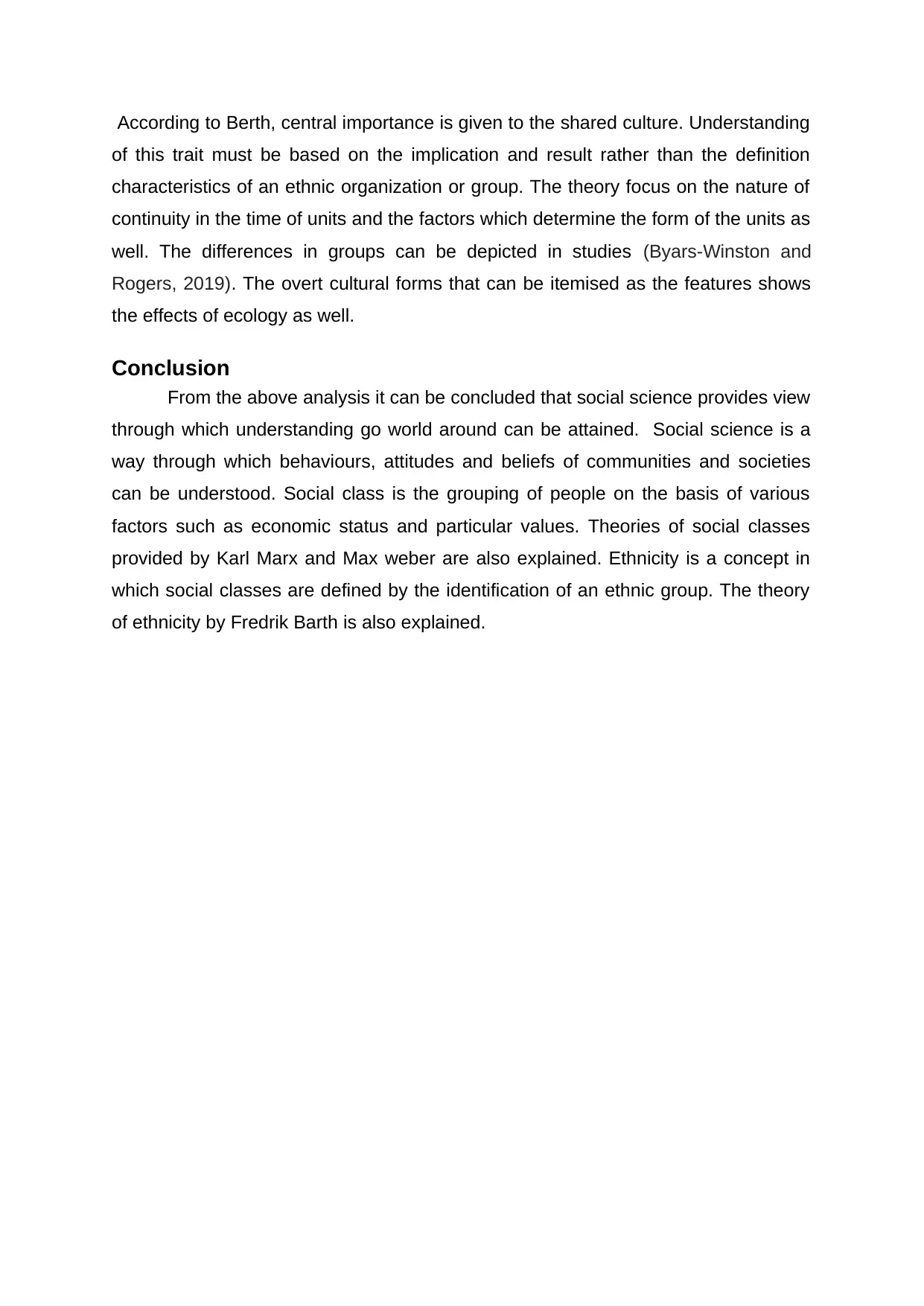
According to Berth, central importance is given to the shared culture. Understanding
of this trait must be based on the implication and result rather than the definition
characteristics of an ethnic organization or group. The theory focus on the nature of
continuity in the time of units and the factors which determine the form of the units as
well. The differences in groups can be depicted in studies (Byars-Winston and
Rogers, 2019). The overt cultural forms that can be itemised as the features shows
the effects of ecology as well.
Conclusion
From the above analysis it can be concluded that social science provides view
through which understanding go world around can be attained. Social science is a
way through which behaviours, attitudes and beliefs of communities and societies
can be understood. Social class is the grouping of people on the basis of various
factors such as economic status and particular values. Theories of social classes
provided by Karl Marx and Max weber are also explained. Ethnicity is a concept in
which social classes are defined by the identification of an ethnic group. The theory
of ethnicity by Fredrik Barth is also explained.
of this trait must be based on the implication and result rather than the definition
characteristics of an ethnic organization or group. The theory focus on the nature of
continuity in the time of units and the factors which determine the form of the units as
well. The differences in groups can be depicted in studies (Byars-Winston and
Rogers, 2019). The overt cultural forms that can be itemised as the features shows
the effects of ecology as well.
Conclusion
From the above analysis it can be concluded that social science provides view
through which understanding go world around can be attained. Social science is a
way through which behaviours, attitudes and beliefs of communities and societies
can be understood. Social class is the grouping of people on the basis of various
factors such as economic status and particular values. Theories of social classes
provided by Karl Marx and Max weber are also explained. Ethnicity is a concept in
which social classes are defined by the identification of an ethnic group. The theory
of ethnicity by Fredrik Barth is also explained.
⊘ This is a preview!⊘
Do you want full access?
Subscribe today to unlock all pages.

Trusted by 1+ million students worldwide
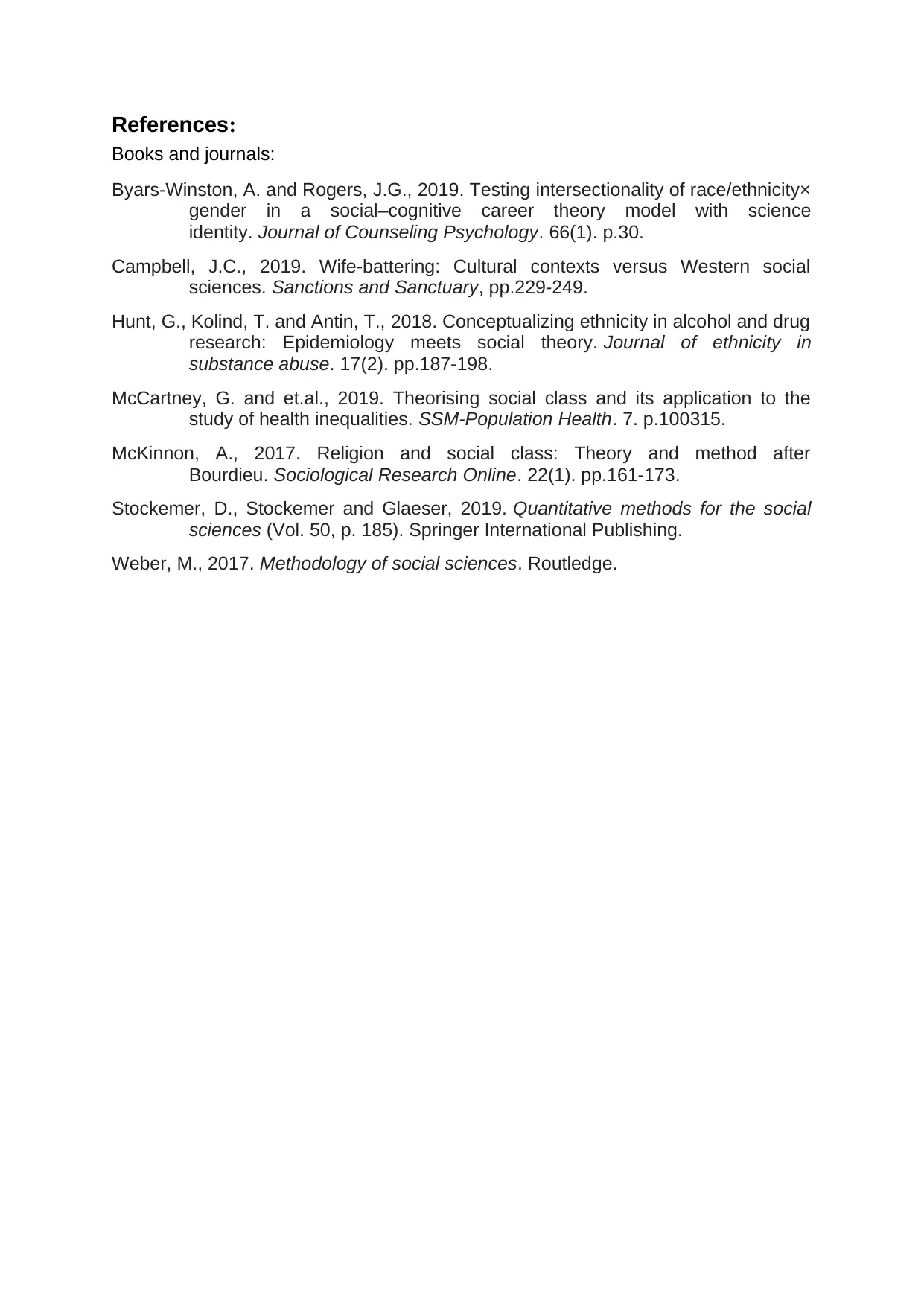
References:
Books and journals:
Byars-Winston, A. and Rogers, J.G., 2019. Testing intersectionality of race/ethnicity×
gender in a social–cognitive career theory model with science
identity. Journal of Counseling Psychology. 66(1). p.30.
Campbell, J.C., 2019. Wife-battering: Cultural contexts versus Western social
sciences. Sanctions and Sanctuary, pp.229-249.
Hunt, G., Kolind, T. and Antin, T., 2018. Conceptualizing ethnicity in alcohol and drug
research: Epidemiology meets social theory. Journal of ethnicity in
substance abuse. 17(2). pp.187-198.
McCartney, G. and et.al., 2019. Theorising social class and its application to the
study of health inequalities. SSM-Population Health. 7. p.100315.
McKinnon, A., 2017. Religion and social class: Theory and method after
Bourdieu. Sociological Research Online. 22(1). pp.161-173.
Stockemer, D., Stockemer and Glaeser, 2019. Quantitative methods for the social
sciences (Vol. 50, p. 185). Springer International Publishing.
Weber, M., 2017. Methodology of social sciences. Routledge.
Books and journals:
Byars-Winston, A. and Rogers, J.G., 2019. Testing intersectionality of race/ethnicity×
gender in a social–cognitive career theory model with science
identity. Journal of Counseling Psychology. 66(1). p.30.
Campbell, J.C., 2019. Wife-battering: Cultural contexts versus Western social
sciences. Sanctions and Sanctuary, pp.229-249.
Hunt, G., Kolind, T. and Antin, T., 2018. Conceptualizing ethnicity in alcohol and drug
research: Epidemiology meets social theory. Journal of ethnicity in
substance abuse. 17(2). pp.187-198.
McCartney, G. and et.al., 2019. Theorising social class and its application to the
study of health inequalities. SSM-Population Health. 7. p.100315.
McKinnon, A., 2017. Religion and social class: Theory and method after
Bourdieu. Sociological Research Online. 22(1). pp.161-173.
Stockemer, D., Stockemer and Glaeser, 2019. Quantitative methods for the social
sciences (Vol. 50, p. 185). Springer International Publishing.
Weber, M., 2017. Methodology of social sciences. Routledge.
1 out of 7
Related Documents
Your All-in-One AI-Powered Toolkit for Academic Success.
+13062052269
info@desklib.com
Available 24*7 on WhatsApp / Email
![[object Object]](/_next/static/media/star-bottom.7253800d.svg)
Unlock your academic potential
Copyright © 2020–2026 A2Z Services. All Rights Reserved. Developed and managed by ZUCOL.





